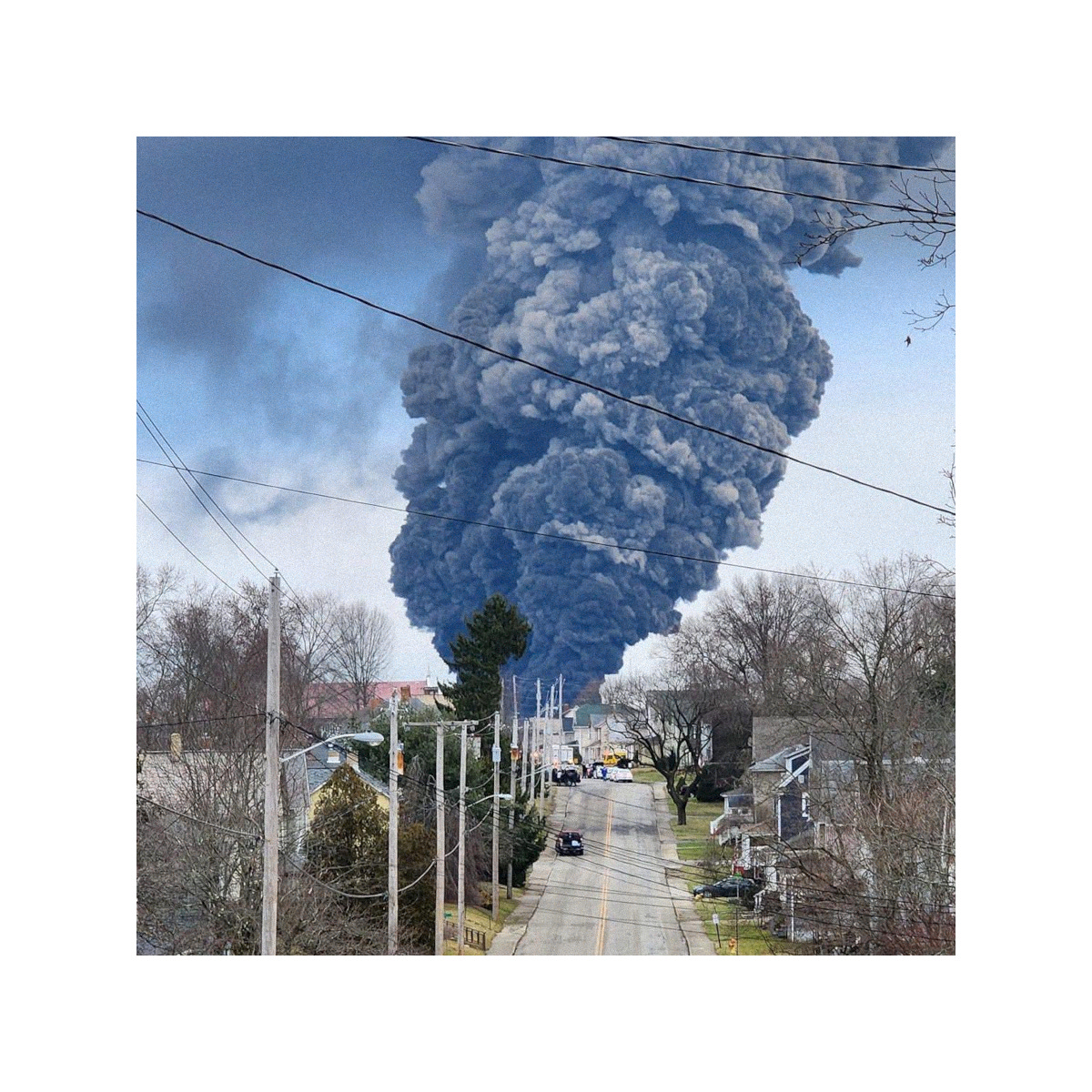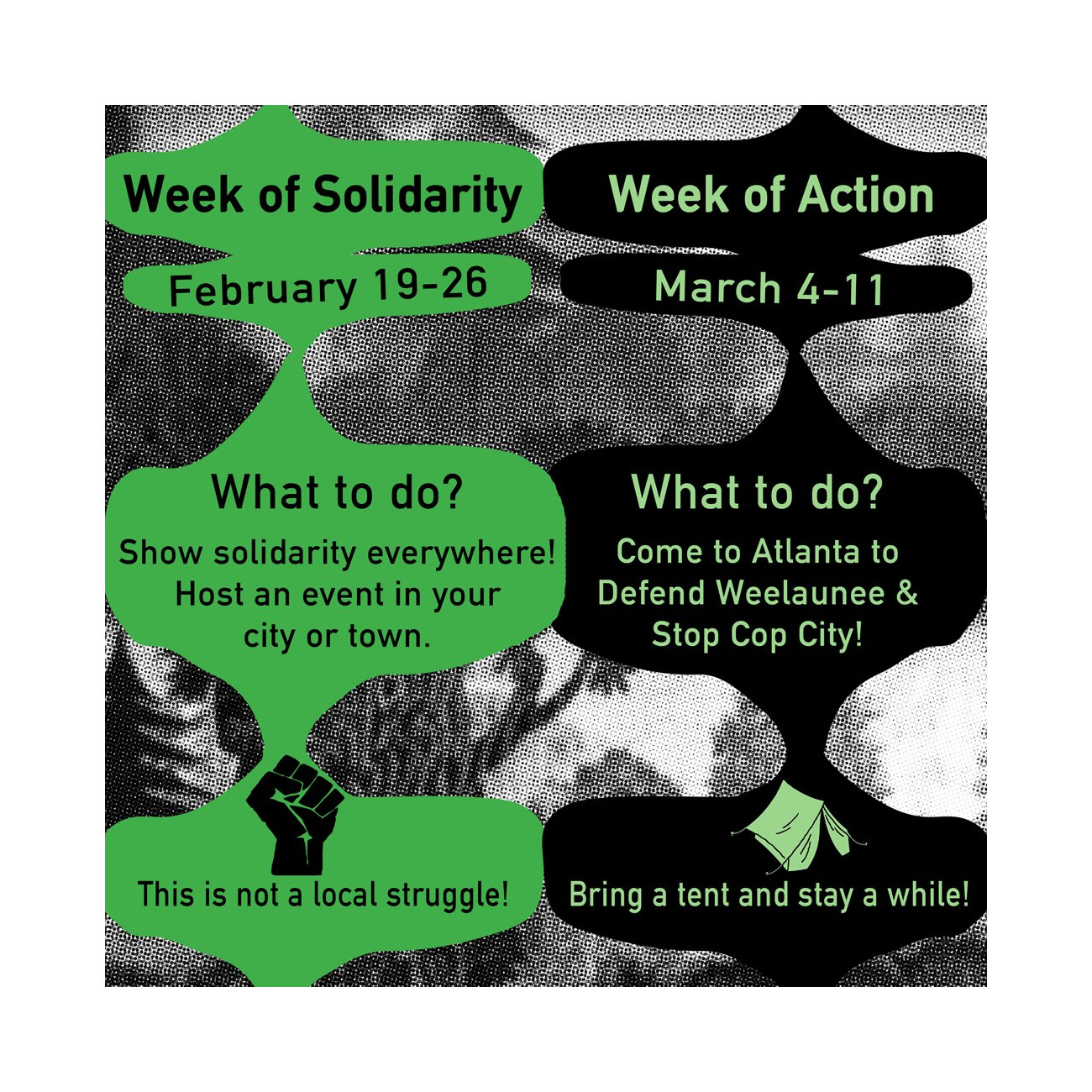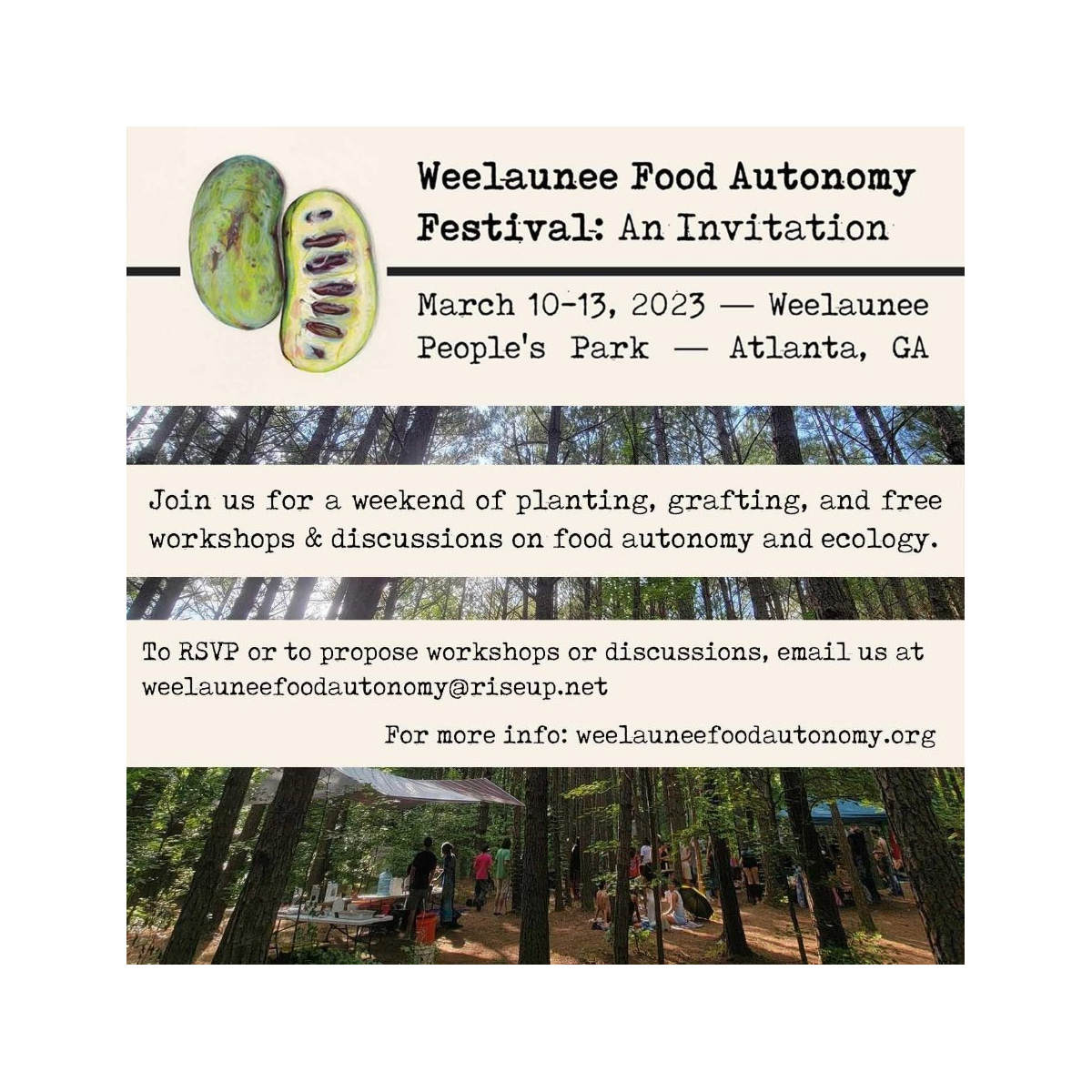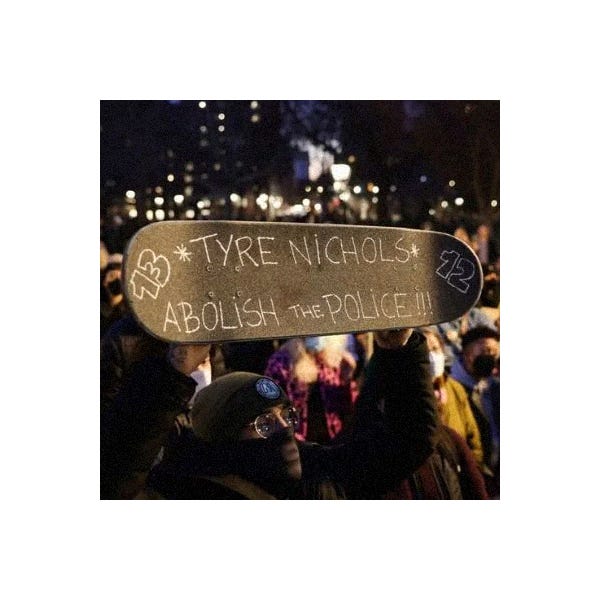Each week brings its own disaster. Disaster—désastre—means to be ill-starred. In the night sky, the green comet seems to invite misfortune. In the night sky, the orange glow of wildfires in Chile and toxic flames in Ohio blaze in fury. Are we unlucky, or under attack?
Four weeks since the police murder of Tortuguita in the Atlanta forest and so much grief, so many questions, remain. Recent bodycam footage only casts more doubt on the already-shaky police narrative. As a forest defender lies there with 13 bullets in their body, the cops chat among themselves about fucking up and shooting their own man. The sorrow, determination, and grit of the movement has since become a national story, with thousands set to descend on Atlanta for the upcoming week of action.
Three weeks since the footage of Tyre Nichols was released, triggering mass protests and universal condemnation. To avoid a repeat of the Third Precinct, even the Memphis chief of police admitted it was worse than Rodney King. By denouncing and disciplining the officers involved, the authorities hoped to retain the legitimacy of policing as an institution. But the streets offered their own rejoinder: it’s not a matter of corruption in one unit, who beat someone to death and bragged about it, but a permanent state of disgrace that power itself enables. Policing is an indefensible act—a violence done to humanity.
Two weeks since a horrific earthquake in Turkey and Syria, killing thousands in a region already devastated by civil war and strained by massive displacement. In southeast Turkey, the widespread destruction is not just a result of being a poor region with shoddy regulations, but the outcome of systemic underdevelopment by the state as punishment of the majority-Kurdish population. A long campaign of exclusion, neglect, and slow violence—depriving people of safe housing, as well as the means to live in self-determination—coexists with the outright warfare waged against Rojava, just south of the border in Syria. In so-called natural disasters, it’s the political terrain which determines who is worth saving, or even mourning.
Tragic isn’t the right word for these events, horrible though they may be. Tragedy implies something cosmic, profound, or fated in them. We, however, see in them the ploys of power, the violence it does, and the denial of justice in every instance. And it is no accident.
In a world of disaster—a world robbed of its stars—where do we find the means to overturn their terrible reign, to recover our lives and our senses? What shot do we have of recovering from the exhausting despair of the catastrophe imposed on us?
We find it there, in the planting of seeds—the same gesture of halting the destruction of land and community as regrowing the forest which sustains us. It’s there, in the marches blocking highways for Tyre Nichols—the same gesture of crowds refusing the constant flow of the economy as demanding justice for another black life stolen by police. It’s there, in the hands passing debris from one person to the next—the same gesture of searching rubble for survivors as building a barricade. It’s there too, in the donning of masks—the same gesture of neutralizing a teargas canister as breathing through the latest toxic spill.
The epoch circulates its problems, distinct in every manifestation yet common to us all. Revolution circulates the gestures, tactics, and strategy necessary to overcome the time of disaster.
Defend the Atlanta Forest
Week of Solidarity & Week of Action
Sharing a recent statement from the movement:
We call on all people of good conscience to stand in solidarity with the movement to stop Cop City and defend the Weelaunee Forest in Atlanta.
On January 18, in the course of their latest militarized raid on the forest, police in Atlanta shot and killed a person. This is only the most recent of a series of violent police retaliations against the movement. The official narrative is that Cop City is necessary to make Atlanta “safe,” but this brutal killing reveals what they mean when they use that word.
Forests are the lungs of planet Earth. The destruction of forests affects all of us. So do the gentrification and police violence that the bulldozing of Weelaunee Forest would facilitate. What is happening in Atlanta is not a local issue.
Politicians who support Cop City have attempted to discredit forest defenders as “outside agitators.” This smear has a disgraceful history in the South, where authorities have used it against abolitionists, labor organizers, and the Civil Rights Movement, among others. The goal of those who spread this narrative is to discourage solidarity and isolate communities from each other while offering a pretext to bring in state and federal forces, who are the actual “outside agitators.” The consequence of that strategy is on full display in the tragedy of January 18.
Replacing a forest with a police training center will only create a more violently policed society, in which taxpayer resources enrich police and weapons companies rather than addressing social needs. Mass incarceration and police militarization have failed to bring down crime or improve conditions for poor and working-class communities.
In Atlanta and across the US, investment in police budgets comes at the expense of access to food, education, childcare, and healthcare, of affordable and stable housing, of parks and public spaces, of transit and the free movement of people, of economic stability for the many. Concentrating resources in the hands of police serves to defend the extreme accumulation of wealth and power by corporations and the very rich.
What do cops do with their increased budgets and their carte blanche from politicians? They kill people, every single day. They incarcerate and traumatize schoolchildren, parents, loved ones who are simply struggling to survive. We must not settle for a society organized recklessly upon the values of violence, racism, greed, and careless indifference to life.
The struggle that is playing out in Atlanta is a contest for the future. As the catastrophic effects of climate change hammer our communities with hurricanes, heat waves, and forest fires, the stakes of this contest are clearer than ever. It will determine whether those who come after us inherit an inhabitable Earth or a police state nightmare. It is up to us to create a peaceful society that does not treat human life as expendable.
The forest defenders are trying to create a better world for all of us. We owe it to the people of Atlanta and to future generations everywhere to support them.
Weelaunee Food Autonomy Festival
An Invitation
Sharing an invitation to the upcoming festival:
You are invited to join for the first annual Weelaunee Food Autonomy Festival March 10-13. Together we will build our capacity in the forest by meeting each other, planting hundreds of fig, pawpaw, and persimmon saplings, grafting onto callery pears, and sharing in a variety of food autonomy workshops and discussions.
As we experience intensifying climate instability, economic disparity, and ecological destruction, our hands have been in the dirt, working to share food and growing techniques within the communities we inhabit. Across the continent, diverse collectives, farms, and mutual aid hubs have organized themselves, especially since 2020, and have been busy creating autonomous food systems, developing grassroots crop breeding, building food production and distribution systems for collective resilience and communal luxury—outside of the market or USDA management. These efforts at mutual aid and horizontal experimentation challenge state violence, racist dispossession, and the myth of scarcity.
At the same time, a movement in Atlanta enters a third year defending a 300 acre forest, which is threatened by construction of a police training facility (dubbed Cop City) and what would be the largest soundstage in the world, solidifying Atlanta as the new Hollywood. Those defending the forest from these dystopian projects are also creating a world outside of the market or state’s control. Eggplants and fig trees sunbathe at the edge of the creek, a cold frame awaits spring germination, foragers commune with the undergrowth, and carpenters improvise structures on the ground and high in the canopy.
Restoring this forest, scarred with a history of indigenous dispossession and prison slave labor, is a complicated task. But we know autonomous food production can break the dirty cycle of land displacement and dependence on the capitalist food system. Moving in this way, towards food autonomy, is essential to the vitality of all life inhabiting the forest. We want to take this opportunity to share lessons and knowledge in all things plants, and learn from the ideas and work of others from all over, inside the fertile context of a forest occupation. Now is the perfect time to combine practical discussions of food autonomy with the movement work of defending the Atlanta forest, in what Cooperation Jackson calls a strategy of “building and fighting.”
“Revolts in our day unfold against the backdrop of a deeper epochal exhaustion, one affecting the very ground of subjectivity.” Kieran Aarons and Idris Robinson on destituent power.
“Wherever we find people who are attempting to protect natural places, who care for the future as well as the past, their thoughts and the acts that follow from them are considered crimes.” Frédéric Neyrat on Defend the Atlanta Forest.
“There is an immense and growing constellation of diverse women and feminized subjects who link up to talk and struggle collectively in defense of life, to sustain life and to transform it.” Raquel Gutiérrez Aguilar on feminist rebellion in Latin America.
“Latour hoped that the shutdown of the economy might help decenter production in favor of attention to ‘engendering’—the relationships and activities, both human and nonhuman, which make our continued existence possible.” Alyssa Battistoni on the late Bruno Latour.
“I insist on not using the term ‘developer’ because all they do is destroy.” Carlos Edill Berríos Polanco on protest camps in Puerto Rico opposing environmentally-destructive infrastructure.
“The vast majority of Earth’s human population lives in societies built on destructive practices.” Cillian Barrett on alternative building and resource conscious construction.
“Uncertain of what lay ahead, these emergent communards began creating the world they wanted.” Carolyn Eichner on the women of the Paris Commune.
“Police departments, as much as any other institution, mediate and define citizenship for millions of Americans.” Jamelle Bouie on police, law, and democracy.
“Infrastructure adaptations will not save us, and agriculture will become impossible in places which are now breadbaskets supplying millions of people.” Gaia Vince on the coming mass climate migrations.
“We depend completely on the billions of other living organisms that make up Earth’s biosphere.” Arwen Nicholson and Raphaëlle Haywood on why earth is our only home.
“China’s rapid, rampant developmentalism over the past decades had destroyed a connection between humans and nature that had previously defined what it meant to be Chinese.” Jacob Dreyer on rural exodus in China.
“The modernist utopian dream was already being shattered by a spiraling capitalist cycle of speculation, construction, deterioration, and demolition.” Joe Zadeh on the end of concrete.
“This harm has been inflicted in the service of unlimited and poorly planned growth, sparked by greed and short-term profit.” Jeff VanderMeer on the destruction of Florida ecology.
You’re on Path B,
Inhabit
This text has been syndicated from Inhabit: Territories.




